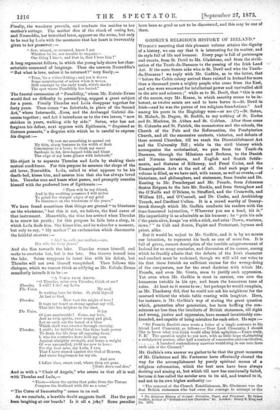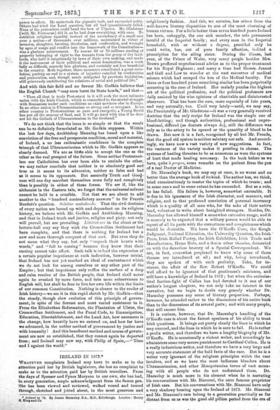GODK[N'S RELIGIOUS HISTORY OF IRELAND.• WITHOUT asserting that this pleasant
volume attains the dignity of a history, we can say that it is interesting for its matter, and its style full of life and humour. Every page is full of personages and events, from St. Devil to Mr. Gladstone, and from the civili- sation of the Tuath-da-Danaans to the passing of the Irish Land Act. If the mere Saxon asks who is St. Devil and who the Tuath- da-Danaans ? we reply with Mr. Godkin, as to the latter, that " before the Celtic colony arrived there existed in Ireland for more than a thousand years a mighty people who came from the East, and who were renowned for intellectual power and unrivalled skill in the arts and sciences ;" while as to St. Devil, that "this is one of the names, says Mr. Keane, in which sanctity seems to be in- herent, as twelve saints are said to have borne it—St. Devil in Irish—and he was the patron of ten religious foundations." And among his peers in the Hagiology were—or are (?) —St. Satan, St. Moloch, St. Dagon, St. Buddh, to say nothing of St. Endee and St. Mochtee, St. Abban and St. Gobban. After these come St. Columba and St. Patrick, the monasteries and the schools, the Church of the Pale and the Reformation, the Presbyterian Church, and all the successive contests, victories, and defeats of these several Churches, till we reach the Disestablishment Act and the University Bill ; while in the civil history which accompanies the ecclesiastical, we pass from the Tuath-da Danaans, through the Milesians and Brehons, to the Danish and Norman invasions, and English and Scotch Settle- ments, and Statutes of Kilkenny, and Penal Coles, and the Emancipation Acts at the end of all. And each page of the volume is filled, as we have said, with names, as well as events,—of historians, and philosophers, and statesmen, from Strabo and Dr. Keating to Mr. Prendergast and Mr. Fronde, from Johannes Scotus Erigena to the late Mr. Buckle, and from Strongbow and the O'Neills and O'Briens, to Strafford, and the Cromwells, and William III., and O'Connell, and Dr. Cooke, and Archbishop Trench, and Cardinal Cullen. It is a crowd worthy of Donny- brook through which Mr. Godkin conducts his readers with the time-honoured injunction, " Wherever you see a head, hit it." His impartiality is as admirable as his humour ; he "puts his eels i the paste alive, knaps 'em with a stick, and cries 'Down, wantons, down !' " to Celt and Saxon, Papist and Protestant, layman and priest, alike.
But it would be unjust to Mr. Godkin, and it is by no means our intention, to represent his book as one of mere fun. It is full of grave, earnest description of the terrible misgovernment of Ireland for so many centuries, and discussion of its causes, among which he frankly admits that the defects of the Irish character and conduct must be reckoned, though we will add our voice to his that these furnish no sufficient excuse for the wrong-doing of the conquerors, nor for the cruel doctrine with which Mr. Froude, and even Mr. Grote, seem to justify such oppression. Yet even when Mr. Godkin is most in earnest, one sees ths humorous twinkle in his eye, and hears the humorous tone of voice. At least so it seems to us ; but perhaps he would complain, as Mr. Thackeray did, that he could not ask his neighbour for the mustard without the whole table roaring with laughter. Here, for instance, is Mr. Godkin's way of stating the great question which, generation after generation, has been baffling the con- sciences no less than the intellects of British statesmen, till right and wrong, justice and oppression, have seemed inextricably con- founded, and capable of being mistaken for each other. He says :—
" Sir Francis Burdett once wrote a letter of a single sentence to his friend Lord Cloncurry, as follows Dear Lord Cloncurry, I should like to know what you think would allay Irish agitation.—Yours truly, F. B.' The question might ha put now, with as little hope ofobtaining a satisfactory answer, after half a century of concession and conciliation. A hundred contradictory answers would ring in our ears from each aide of the Channel."
Mr. Godkin's own answer we gather to be that the great measures of Mr. Gladstone and Mr. Forteacue have effectually cleared the way for the accomplishment by purely spiritual means of a religious reformation, which the beat men have been always desiring and aiming at, but whioh till now has continually because it has called the secular arm to its aid, and trusted to it, and not to its own higher authority :—
" The removal of the Church Establishment, Mr. Gladstone was the first British statesman who had even the courage to attempt or the
• The Religious History of Ireland: Primitive, Papal, and Protestant. By James Oodkin, Author of .Ireland and her Churches," Sc. London: Henry S. King and Co. 1873.
power to effect. Ho undertook the gigantic task, and succeeded nobly. Others had tried the Land question, but all had ignominiously failed. None of the pretenders could bend the bow of Ulysses. Mr. Gladstone twith Mr. Fortescue] did it, as he had done everything, with ease. To establish religions equality instead of the ascendancy of a small sect over a nation—of thousands over millions, maintained in virtue of invasion, slaughter, burning, desolation, and confiscation, and wrought by ages of usage and conflict into the framework of the Constitution— was a glorious achievement,. To rescue 60 or 70 millions sterling of property belonging of right to the tenants from the grasp of the land- lords, who held it iniquitously by laws of their own making, and made it the instrument of their political and social domination, was a work fully as difficult, scarcely less glorious, and certainly not less beneficial to the country. Both together, these measures constituted a great revo- lution', putting an end to a system of injustice entailed by confiscation and persecution, and, though much mitigated by previous legislation, still grievously embittering the relations of social and political life."
And with this fair field and no favour Mr. Godkin believes that the English Church "may soon burst its State bonds," and that-
" Then all that is truly Protestant in it will seek the most intimate union with the Irish Church, which is committed to the mortal struggle with Romanism under such conditions as exist nowhere else in Europe. In no other nation is Ultramontanism so strong and so arrogant. In no other country is Protestantism so pure and energetic. • Young David has put off the armour of Saul, and it will go hard with him if he does not hit the Goliath of Ultramontanism in the forehead."
We do not think that the issue is so simple or that the result can be so definitely formulated as Mr. Godkin supposes. Within the last few days, Archbishop Manning has based upon a like conviction of the free and prosperods condition, moral and material, of Ireland, a no less enthusiastic confidence- in the complete -triumph of that Ultramontanism which to Mr. Godkin appears so clearly doomed. We are as Mete able to accept the one as the -other as the real prospect of the future. Since neither Protestant- ism nor Catholicism has ever been able to exclude the other, we may rather conclude that neither is so absolutely good and true as it seems to its advocates, neither so false and bad -DA it seems to its opponents. But assuredly Truth and Goori- mess will one day manifest themselves more fully and completely than is possibly in either of these forms. We err if, like the alchemist in the Eastern tale, we forget that the universal solvent cannot be held in a crucible. Not that we are about to add another to the "hundred contradictory answers" to Sir Francis Burdett's question. Solvitur anibulando. That the civil destinies of every nation are bound up with and dependent on its religious history, we believe with Mr. Godkin and Archbishop Manning, and that in Ireland truth and justice, religion and piety, not only will prevail, but are prevailing. Littirateurs in the closet or the lecture-hall may say they wish the Cromwellian Settlement had
been complete, and that there is nothing for Ireland but a new and more thorough conquest of that sort. But even they do not mean what they say, but only "unpack their hearts with words," and " fall to cursing "- because they know that their cursing cannot take effect. Such talk is indeed the expression of a certain popular impatience at each indication, however trivial, 'that Ireland has not yet reached an ideal of contentment which we do not look for among ourselves or any other part of the Empire ; but that impatience only ruffles the surface of a deep and calm resolve of the British people, that Ireland shall never again be crushed by mere force, and into mere subservience to English sill, but shall be free to live her own life within the limits of our common Constitution. Nothing is clearer to the reader of Irish history—we see it in this rapid sketch by Mr. Godkin—than the steady, though slow evolution of this principle of govern- ment, in spite of the fiercest and most varied resistance to it. From the Elizabethan Reformation, the Plantation of Ulster, the Cromwellian Settlement, and the Penal Code, to Emancipation, Education, Disestablishment, and the Land Act, how enormous is the change, how heartily have we entered on, and how far have we advanced, in the nobler method of government by justice and with humanity! And this beneficent method and course of govern- ment are now so established, that they cannot again be departed from ; and Ireland may now say, with Philip of Spain,—" Time and I against the world."



































 Previous page
Previous page